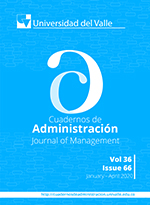Coordinating sustainability, globalization and urban intelligence with the Habitat III and 2030-SDG agendas: the challenge of sustainable urban development in cities
Main Article Content
Currently, there are difficulties in coordinating the three determinants of urban development in cities: Globalization, Urban Intelligence, and Sustainability. This makes it difficult to implement the agendas of the Sustainable Development Goals and Habitat III. This article features an introduction, discussion on the tensions among the determinants of Sustainable Urban Development (SUD). The idea of a sustainable city, which is defended in this research, is proposed thereafter, which seeks to establish the degree of consistency between these three factors. The methodology is described next on: 83 cities were sampled and the simple and multiple correspondence analysis techniques were applied. Then, we move on to the results, which found that while the three phenomena are congruent, it is not the same in every city. It was also evidenced that the greater the urban intelligence of a city, the more sustainable it will be; and the less sustainable it will be if it is oriented only towards globalization. Finally, it is concluded that if a city wants to be sustainable, it must make efforts to coordinate a joint agenda with all three conditioning factors to balance them out and neglect none.
- Henry Caicedo Asprilla, The role of regional innovation systems in cities Global regions , Cuadernos de Administración: Vol. 27 No. 45 (2011)
- Henry Caicedo Asprilla, An approach to identifying, measuring, and generating reciprocal spillovers , Cuadernos de Administración: Vol. 28 No. 48 (2012)
- Henry Caicedo Asprilla, Carlos Heman Gonzalez Campo, Aracely Castro Díaz, OPTICOR CREATE METHODOLOGIES TO RAlSE THE REGIONAL COMPETITlVENESS: THE MEfHODOLOGY SIIC, APPUED TO THE CHAIN OF LEATHER, SHOES AND LEATHER GOODS. , Cuadernos de Administración: Vol. 24 No. 40 (2008)
Accepted 2020-04-06
Published 2020-03-18

This work is licensed under a Creative Commons Attribution-NonCommercial-NoDerivatives 4.0 International License.





